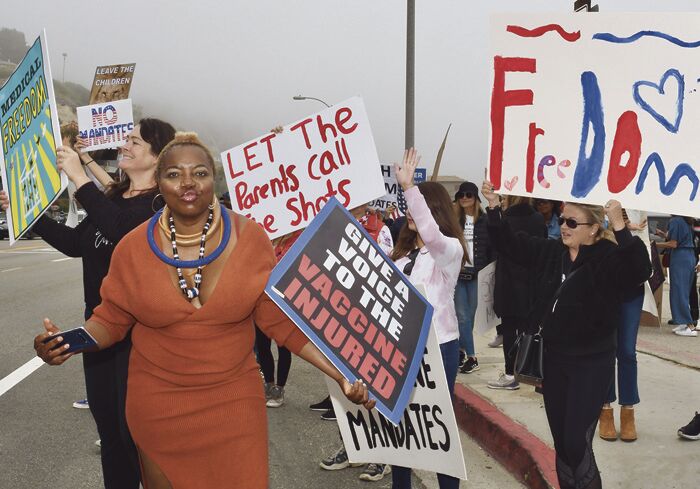
COVID-19 vaccines are recommended by the Centers for Disease and Control and Prevention (CDC) to reduce the spread of COVID-19. On Oct. 29, the United States Food and Drug Administration authorized a pediatric dose of the Pfizer vaccine for children ages five through 11, opening up vaccine access to all Americans ages five and up. According to the CDC, children five years and older are still at risk of transmitting COVID-19.
While vaccines for measles, mumps, rubella and more are required in schools, the COVID-19 vaccine is so new, it has not yet joined the regimen—but that will change soon.
Governor Gavin Newsom signed an executive order SB 742 on Oct. 1, mandating students eligible to be vaccinated must receive the COVID-19 vaccine by the start of the 2022-23 school year. This made California the first state in the nation to announce COVID-19 vaccine requirements for students attending in-person school.
The vaccine is considered a requirement for all LAUSD students beginning Jan. 10, 2022. And the Santa Monica-Malibu Unified School District is considering a vaccine mandate for students as well—but many parents and community members have raised concerns, primarily citing unknown longterm effects.
“It is our goal to keep students in school and reduce quarantines that our younger students are experiencing due to positive cases,” Dr. Ben Drati, SMMUSD superintendent, said in a press release. “Vaccinations have proven effective to best ensure our goals, reduce the severity of symptoms if COVID is contracted and greatly reduce serious longterm illness or death.”
Last week, a group of community members rallied in front of the Malibu Pier to protest against proposed vaccine mandates in Malibu schools.
Parent Hamish Patterson, along with other parents, said his main concern was the long-term effect of the vaccine.
“We’re out here to essentially protect the children and make sure that no mandates come down on our most vulnerable population in our community,” Patterson said. “At this point, all the experts basically said they have no idea what the longterm effects would be on these vaccines.”
Patterson said the term “anti-vaxxer” has changed.
“It used to be ‘anti-vaxxer’ for people that didn’t believe in vaccines—but now it’s mandates,” Patterson said. “We’re not anti-vaccine. We’re in for our personal choice and liberty and making your own informed consent based upon your own interaction with medical professionals.”
Many protesting expressed distrust of COVID-19 vaccines, which have been available to the public for about 11 months.
“The one-size-fits-all model is just not appropriate and mandates exclude people that have real concerns about their health. We just don’t know what this will do to a six-year-old child,” Patterson said. “My child is not an experiment for big pharma [pharmaceutical corporations].”
On Monday, parents spoke for more than an hour before Malibu City Council, requesting that members support their desire to reject a mandate for Malibu students.
“This is not a matter of being ‘anti-vaxx.’ This is a matter of medical freedom, choice, autonomy and rights,” said mom of three Heather Alfano, who said she was a vaccinated ICU nurse.
Anti-mandate—or anti-vaccine—sentiment is nothing new in Malibu, where two Malibu area private schools were ranked among the 2018-19 top 10 list of schools with the lowest vaccination rates in the state: Muse School in Calabasas and Westside Waldorf School in Pacific Palisades. In 2019, both Point Dume and Juan Cabrillo elementary schools’ vaccine rates were low enough to place students in “vulnerable” categories, according to California Department of Public Health Immunization Branch’s Shots for Schools.
“California … has one of the strictest vaccination laws in the country, which prevents children from skipping their shots unless a doctor exempts them for a medical reason,” according to a 2019 article published in the LA Times. The repeal of locally popular “personal-belief exemptions” came about due to a bill co-authored by former SMMUSD Board Member-turned-State Senator Ben Allen in 2015.
Malibu’s sole representative on the SMMUSD School Board, Craig Foster, spoke up as the sole opposition to vaccine mandates at an October board meeting, stating it shouldn’t be the school board’s job to mandate a permanent health decision for students.
“I don’t like telling anybody what to do with their body, especially when it’s a vaccination that you can’t undo, but at the same time we are having this crisis,” Foster said. “So, the school district has voted to mandate that our employees, staff [and] teachers must be vaccinated in order to work, and some people have chosen not to be vaccinated.”
Foster said he would like to see a more permissive policy where there are choices and accompanying consequences and where electing to not vaccinate comes with a much higher burden of testing—rather than the door.
“I don’t want to see anybody lose their job over this,” Foster said. “So, from my point of view, mandating the kids must be vaccinated [and] taking that power away from parents is really problematic for me. And it’s much more problematic with kids than it is with adults, because kids have much more vulnerable immune systems.”
Foster, who said he is in favor of vaccines, said the mandates for children to receive the COVID-19 vaccine in order to continue in-person learning takes away from their constitutional rights.
“I have a huge problem with that because attending public school is a constitutional right and a fundamental right of being a citizen and conditioning that on medical treatment—it’s not OK,” Foster said. “What I object to is the school district—without authority or medical expertise—taking that decision out of parents’ hands.”
For more information on the COVID-19 vaccine, visit: publichealth.lacounty.gov/media/Coronavirus/docs/about/FAQ-Vaccine.pdf.


